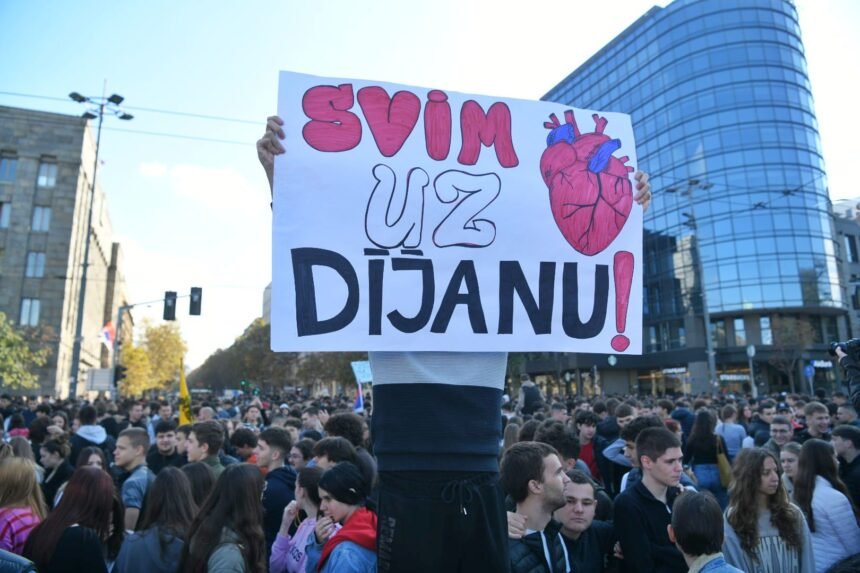In recent years, Serbian society has experienced unprecedented tragedies, serving as a mirror of a regime that denies all responsibility, insults the victims, and manipulates public emotions.
On November 2, Dijana Hrka, mother of 27-year-old Stefan, one of 16 victims of the collapse of the canopy structure at the Novi Sad railway station, began a hunger strike in front of the National Assembly. A moment that may one day find its place in history textbooks. Her act symbolizes utter despair and resistance to Aleksandar Vučić’s regime, which has led society into violence, repression, and systemic corruption—the very roots of these tragedies.
During a commemorative gathering on the eve of her strike, marking 11 months since the fatal collapse, the president cynically inquired: “What’s happening on Saturday, a match?” and later called the mourning crowd a “failure”, dismissing them with insults such as traitors, Ustaše, and blockers.
An Insulting Political Stunt
Not stopping there, Vučić staged a parallel act: Uglješa Mrdić, an SNS MP, also began a hunger strike — supposedly demanding institutions to do their work, yet only targeting two individuals, irrelevant in the wider chain of corruption. Meanwhile, Hrka was pushed to the margins — literally — placed away from the Parliament steps, next to the infamous “Ćacilend”, the camp for regime loyalists set up in Pionirski Park.
To further humiliate her, a speaker played the song “A Mother Went to Look for Her Son” — a cruel taunt, given she will never celebrate a wedding with her son.
Vučić also bused in his supporters from Kosovo, using bribes or pressure tactics — stripping them of dignity and fueling division among citizens. On national TV, messages of hatred mixed with open disdain toward the grieving and protesting public.
The Systematic Persecution of Hrka
Since losing her son, Hrka has been harassed, threatened, and humiliated. She received images of her other son’s eyes gouged out — a clear message from those threatened by her fight for truth.
Her determination only grew: she knew her truth and would “go to the end” — even if that meant being carried away “in a coffin from the protest tent.”
The hunger strike continued amid loud music, but on the fifth day, after Hrka threatened to storm “Ćacilend,” the speakers suddenly went silent — at the exact moment Vučić traveled to Brussels for an EU enlargement summit. A coincidence? Or a response to the European Parliament’s resolution criticizing the polarization and growing repression in Serbia?
A Grieving Society, Left to Fend for Itself
Hrka found solidarity with the parents of the children killed in the Vladislav Ribnikar school shooting in May 2023 — the worst mass school shooting in Serbia’s history. As Ninela Radičević, mother of victim Ana Božović, puts it: “The state bears the greatest responsibility for this massacre—but what has society done? It did everything possible to forget it.”
In Serbia, no culture of dialogue exists. Every attempt to memorialize national trauma becomes politicized, ignored, or suppressed. Even the effort to make the classroom where the children were murdered into a memorial center was reduced by officials to “a classroom or perhaps a hallway.”
A Pattern of Pain Without Justice
After the Ribnikar tragedy came Dubona and Malo Orašje, where 21-year-old Uroš Blažić killed nine and wounded 13. Despite known offenses and a violent record, he faced little legal consequences prior to the massacre — thanks to his connections.
Instead of systemic change, Vučić responded with populist measures and calls for harsher punishment — shielding his own failings while the families were abandoned.
Families of victims received one-time financial aid but no lasting support. The non-profit B92 Fund occasionally helps cover life essentials, but as director Veran Matić notes, “institutional support does not exist — and the families are too proud to ask.”
Decades of Corruption and Grief
One of the most devastating examples is the family of Milomir Milivojević, who died in a factory explosion in Lučani in 2017. After seven years of legal delays, the family still awaits justice. The factory director remains protected by the system — a familiar pattern.
Similarly, Milomir Jaćimović of Novi Sad started a hunger strike after being targeted, fined, and economically destroyed by the state. Left with nothing after repeated harassment, he was left with no other choice.
A Sick Society Needs Healing
One viewer put it bluntly on Utisak Nedelje:
“When all this ends, and the regime falls, we’ll first need to heal ourselves before we fix the institutions.”
But as Ninela Radičević warns, “Why wait? Why not start being better people now?”
The answer may lie in the fact that manipulation of tragedy has become a daily political tool. The president changes course constantly—not to improve society, but to keep it sick and fractured.







